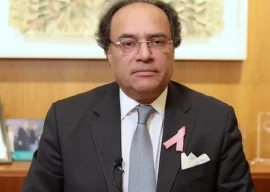
Muhammad Azhar Siddique had filed a petition on Monday stating that over two dozen patients had died and dozens of others were in critical condition after using medicines supplied by the PIC. The numbers have since crossed 80 for the dead, while over 350 are under treatment in various Lahore hospitals. He stated that the case was of sheer negligence of the PIC administration for which they should be taken to task.
He contended that the supply of adulterated or spurious drugs had played havoc with lives of innocent citizens. Furthermore the federal and provincial health departments had failed to take action against the responsible persons. He stated that there was need for thorough investigation of the matter and also to affix responsibility on and cancel licences of the pharmaceutical companies manufacturing substandard medicines.
He requested that to ascertain the truth and fix responsibility, a judicial commission should be constituted to investigate the matter.
COMMENTS (3)
Comments are moderated and generally will be posted if they are on-topic and not abusive.
For more information, please see our Comments FAQ





























1714129906-0/Clint-Eastwood-(1)1714129906-0-270x192.webp)






It is about time that high judiciary should pay attention on the real problems of poor Paksitanis rather than chasing an unsigned piece of paper by American double agent. These are the real serious issues killing the public not the politics and begging Mansoor to honor Pakistan and its courts by his appearance. Please take care of real people with real issues and not shadows.
Medicines (drug formulations) consist of 2 parts: the Active Pharmaceutical Ingredient (API) and the inactive ingredients (excipients). For example, Brufen has 200mg of Ibuprofen (API) but the bulk of the tablet is made up of the excipients or binders in fixed concentrations. The entire process of buying raw material, manufacturing drug and releasing it to the market is governed by international standards called Good Manufacturing Practices (GMP) which are legally binding. Drug manufacturers are required by law to purchase all ingredients (all raw material not only the API) from approved facilities and of certain specifications. If there is GMP violation, the chances of using a contaminated ingredient are increased. Punjab government’s laboratory has declared that the active ingredients for all of these medicines have been checked and have been found to be alright. In this case, it is likely that at least a single inactive ingredient, common to all of these formulations, was contaminated, and these local manufacturers probably bought the same contaminated ingredient when they manufactured these batches. However, a complicating factor is the fact that only medicines dispensed from the PIC have been found to have issues. This can only be explained if the manufacturers made exclusive batches for PIC and did not release any medicines from these batches in the open market. If the sourcing of the raw material is tracked down, including the inactive ingredients, for all of these medicines, the problem could be identified.
The court, in addition to looking the manufacturing practices of the pharmaceutical companies, should also look at how medicines are approved to be marketed in Pakistan. Just because an active drug is shown to be safe and effective in the original formulation developed by the first manufacturer of the brand name does not mean that any formulation containing that amount of the active drug will be safe and effective. For example, Pfizer developed Lipitor containing 20mg of Atorvastatin (active drug) in a formulation containing many inactive ingredients in fixed concnetrations. Pfizer conducted clinical trials to prove that Lipitor (which means Atorvastatin in that particular formulation) is safe and effective. This does not mean that any formulation which contains 20mg Atorvastatin is safe and effective. Any new formulation of Atorvastatin needs to establish safety and efficacy for its own formulation and cannot use Lipitor data to get government's approval for marketing. This approach, adopted by the Government of Pakistan, is scientifically invalid and dangerous for public health and safety.